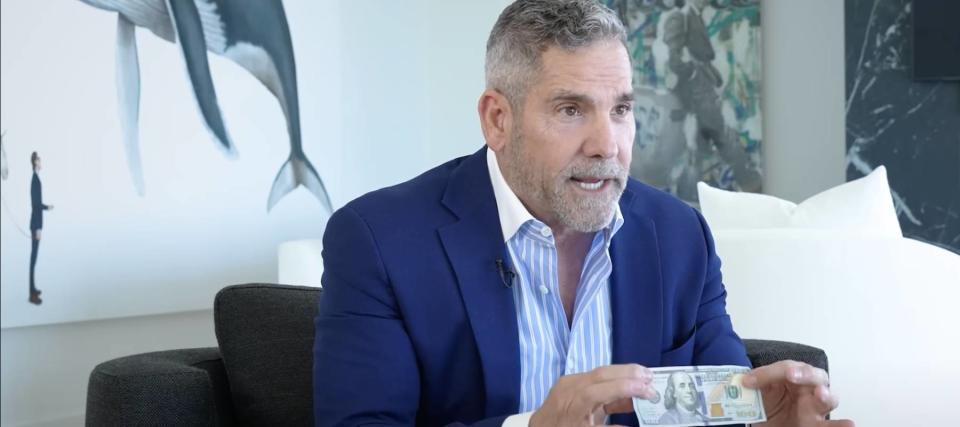Grant Cardone blasts Dave Ramsey's advice as recipe for staying 'middle class' — says it's not how to 'get to the top'

Dave Ramsey gets his fair share of criticisms for some of his ideas that seem a little … old fashioned.
Gen Z and Millennial financial content creators have recently called him out for his views on the housing crisis and the cost of childcare. But his unconventional perspective on debt tends to get the biggest backlash.
Don't miss
Car insurance rates have spiked in the US to a stunning $2,150/year — but you can be smarter than that. Here's how you can save yourself as much as $820 annually in minutes (it's 100% free)
'You didn't want to risk it': 80-year-old woman from South Carolina is looking for the safest place for her family's $250,000 savings. Here's Dave Ramsey's response
These 5 magic money moves will boost you up America's net worth ladder in 2024 — and you can complete each step within minutes. Here's how
Ramsey’s insistence on a “debt-free” lifestyle could be so outdated that even his fellow baby boomers disagree with him. Real estate mogul Grant Cardone, who is three years older than Ramsey, isn’t a fan of the “debt-free” lifestyle.
“I think Dave’s good for people that want to stay in the middle class,” Cardone said in an episode of The Rich Somers Report. To get to the top, he believes everyone needs a dose of so-called “good debt.”
Here’s why borrowing money is such a divisive issue even for ultra-rich entrepreneurs.
Good debt vs. bad debt
There’s a group of uber-wealthy entrepreneurs who consider debt an essential tool in their arsenal. Cardone is firmly in that group.
“At Cardone Capital we always use debt but never over leverage, keeping our debt leverage in the 65% range,” he once said.
“Goldman Sachs ain’t worried about debt,” he told Rich Somers. “JP Morgan’s not worried about debt. Elon Musk is not worried about debt.”
Indeed, Musk has borrowed billions of dollars to acquire companies such as Twitter and billions more through loans against his shares to fund his other ventures.
Similarly, Jeff Bezos borrowed $2 billion to finance Amazon’s growth during the dot-com bubble.
Entrepreneurs like Cardone, Bezos and Musk consider debt used to expand a business or bolster investments “good.” Borrowing money to invest in appreciating assets, such as a house, or to enhance your skills, such as student loans, could be considered beneficial.
However, some entrepreneurs believe that borrowing money adds risk that is simply not worth it.
Read more: 'It's not taxed at all': Warren Buffett shares the 'best investment' you can make when battling rising costs — take advantage today
Is all debt “bad”?
Like any other investor, Dave Ramsey financed his early real estate investments with debt. However, a brush with bankruptcy in the 1980s left him scarred for life.
Now, the financial guru insists on a debt-free path to wealth. “Debt always equals risk, and it’s always dumb,” he wrote on his website last year. “While your calculator may say that leveraging debt can help you get rich faster, it doesn’t consider risk. But when you pay cash for everything, you don’t have to worry about that risk.”
These sentiments have been echoed by the world’s most famous investor: Warren Buffett. “You really don't need leverage in this world much,” Buffett once said. “If you're smart, you're going to make a lot of money without borrowing.”
Fellow billionaire Mark Cuban once explained that paying off debt was like making a good investment: “Whatever interest rate you have — it might be a student loan with a 7% interest rate — if you pay off that loan, you’re making 7%. That’s your immediate return, which is a lot safer than trying to pick a stock or trying to pick real estate, or whatever it may be,” he once told CNBC.
It seems clear that there is more than one path to success. For most people, the choice between “good debt” and “no debt” could depend on their investment style and appetite for risk.
What to read next
Thanks to Jeff Bezos, you can now use $100 to cash in on prime real estate — without the headache of being a landlord. Here's how
Beating the market is no myth: These expert stock-pickers' recent success could help you build generational wealth
BlackRock CEO Larry Fink has an important message for the next wave of US retirees — here's how he wants to solve the country's retirement crisis
This article provides information only and should not be construed as advice. It is provided without warranty of any kind.

 Yahoo Finance
Yahoo Finance 